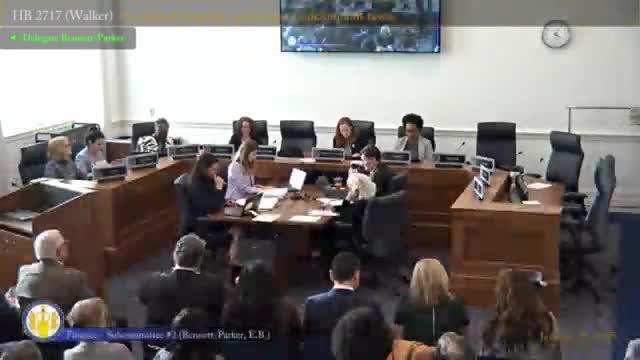Subcommittee backs 25% cap on wage garnishments for state and local tax debts
Get AI-powered insights, summaries, and transcripts
Subscribe
Summary
The House Finance subcommittee reported House Bill 1979 with a substitute that would cap garnishments of disposable weekly earnings at 25% for state and local tax collections; the measure passed the subcommittee 5-1 after testimony from legal aid advocates and county treasurers.
The House Finance Subcommittee reported House Bill 1979 with a substitute, moving a 25% cap on the percentage of disposable weekly earnings that state or local governments may garnish to collect tax debts. The substitute passed the subcommittee by a 5-1 tally.
Delegate Lee Hernandez, the bill’s patron, told the committee the measure makes “necessary changes to wage garnishments in Virginia.” Hernandez said current law permits garnishment of 100% of wages in some state and local tax-collection cases and that Virginia is an outlier nationally. The substitute adds a delayed enactment date of Jan. 1, 2026, and sets a 25% maximum on garnished disposable earnings.
Supporters who testified included Eric Link of the Virginia Bar Association and Jay Spear of the Virginia Poverty Law Center. Link said the Bar Association included the change in its legislative package; Spear said losing an entire paycheck has “ruined” lives and that the cap would help low-income Virginians.
Opposition testimony came from speakers representing the Treasurer’s Association of Virginia. Alan Albert and Jody Acosta, president of that association and treasurer of the City of Falls Church, described the longstanding legal priority of tax debts (a code section that dates to 1919) and said many treasurers use higher garnishment percentages as a last-resort collection tool to prompt contact from delinquent taxpayers. They urged a higher maximum or treatment similar to garnishments for support payments.
A representative from the Department of Taxation told the committee the substituted bill—limited to the 25% cap and the delayed effective date—would be routine for the agency and posed no implementation barrier. Delegate Hernandez said the fiscal impact statement accompanying the substitute suggests the department now views implementation as routine.
After brief closing remarks from the patron and no further questions, the clerk opened the roll and announced the substitute reported out of subcommittee by a 5-1 vote.
The subcommittee record shows the measure now moves forward with the substitute language that (1) caps garnishment at 25% of disposable weekly earnings for state and local tax debts and (2) takes effect Jan. 1, 2026. The committee did not adopt alternate percentage levels suggested during testimony.
